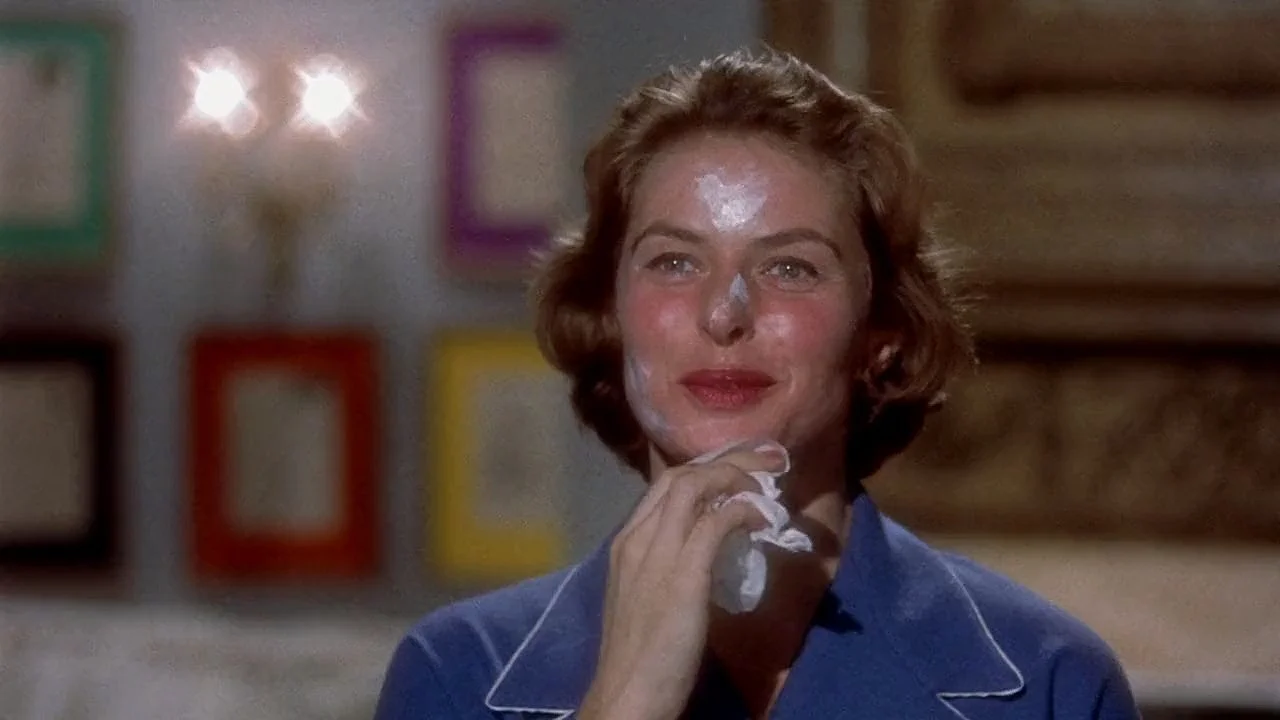Watching Indiscreet
I’m a fan of the work of Cindy Sherman, which is I suppose why once in a while I have to play around with movie characters. Fairly recently I wrote a post about Rear Window, a Hitchcock film, and today, I’m revisiting a Stanley Donen film, Indiscreet (1958). I have a particular fondness for pretty much anything Cary Grant is in, and am always in awe of Ingrid Bergman.
Have you seen it? I own my own copy but you can also watch it online in various places.
In contemporary reviews, the movie was universally said to be fluffy.
For example in the NY Times Film Review, 1958:
"Indiscreet" is as light, airy and weightless as a soufflé. But all concerned have made it a most palatable concoction.
In New Statesman, the movie is said to be “slight and elegant.” And really, it feels like a light soufflé but also more than that — we know how tricky it is to make a soufflé! I’ve (obviously) always loved that opening scene where Anna is removing her make-up. She’s wearing a blue, rather ordinary, robe. Bergman is a famous actress playing a famous actress, and there she is showing her unvarnished self, her cold-creamed visage. For Anna, Bergman’s character, it’s pretty close to one of those love-at-first-sight movie moments, and she’s perfect, not quite unphased at having been caught in this most ordinary moment.
But it also seems rather brave, too, even nowadays, to show.
Later she’ll pour Philip (Grant) a scotch and soda and say that she likes a man with a glass in his hand. But that also he’ll have to take a sip once in a while as that’s “part of the picture.” And with the backdrop of all the paintings in her London apartment, one can’t help thinking about the “picture” they’re in. They go to a ballet as a first date, though give up their seats to a young couple. Anna takes a role in a play, which she later plans on leaving so that she can be with Philip in NYC. The plot synopsis can be read here. But in short, there are lots of moments when the actors, playing actors, are acting. Some are outright lying. Some are playing a role thrust upon them as Carl does, or canceling an unknowing walk-on performance due to appendicitis (David). The rules of society are what precipitate all this acting and lying.
We’re not in Jane Austen territory, but in 1958 the position of women in society was quite different. Still, they take their power where they are able, and isn’t it satisfying to hear the “oh shut up” line? (Spoiler alert if you watch the clip below (if you’re in the newsletter you might have to read in browser).
I have to admit, that half the reason I like the movie so much is for the set design, the Technicolor pizazz, the fancy dresses, the art everywhere, the cocktail tables, the crystal decanters of scotch. Yes, it’s airy, it’s a calgon take me away kind of film. But we’re all actors to some degree, whether in our pyjamas or in a fancy gold gown. We’re playing parts. We tell ourselves and others lies so that we may continue on in our lives, sometimes. We try to be kind with our acting, our lies, but inevitably the truth catches up with us.
To diverge from the movie a bit, there’s an entry in Kathleen Stewart’s extraordinary book, Ordinary Affects, where she talks about agency.
She says, “Agency can be strange, twisted, caught up in things, passive, or exhausted. Not the way we like to think about it.”
And, “it’s caught up in things. Circuits, bodies, moves, connections. It takes unpredictable and counterintuitive forms. It’s lived through a series of dilemmas: that action is always a reaction; that the potential to act always includes the potential to be acted on, or to submit; that the move to gather a self to act is also a move to lose the self; that one choice precludes others; that actions can have unintended and disastrous consequences; and that all agency is frustrated and unstable and attracted to the potential in things.”
In short, agency is complicated. And I think this says a lot about Indiscreet, too. Agency, says Steward is “what we mean by ‘having a life’ (as in ‘get a life).” And that’s what Anna is trying to do, have a life, even though a successful woman is supposed to forfeit that in the personal realm. She wants a good life, including the richness of love. Don’t we all.














